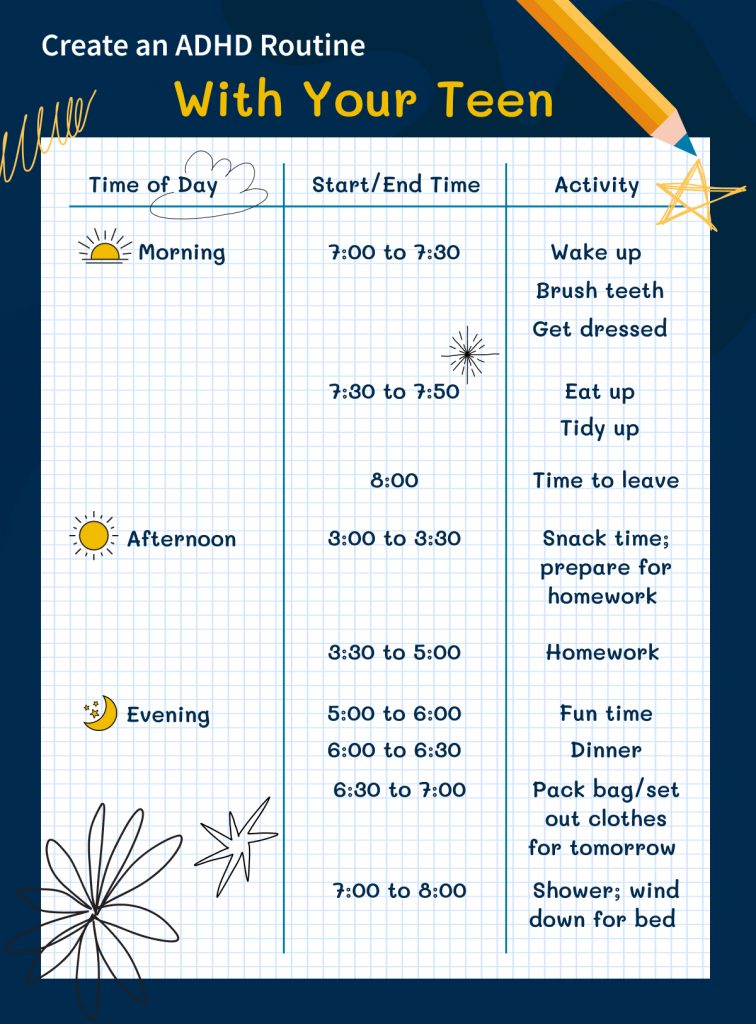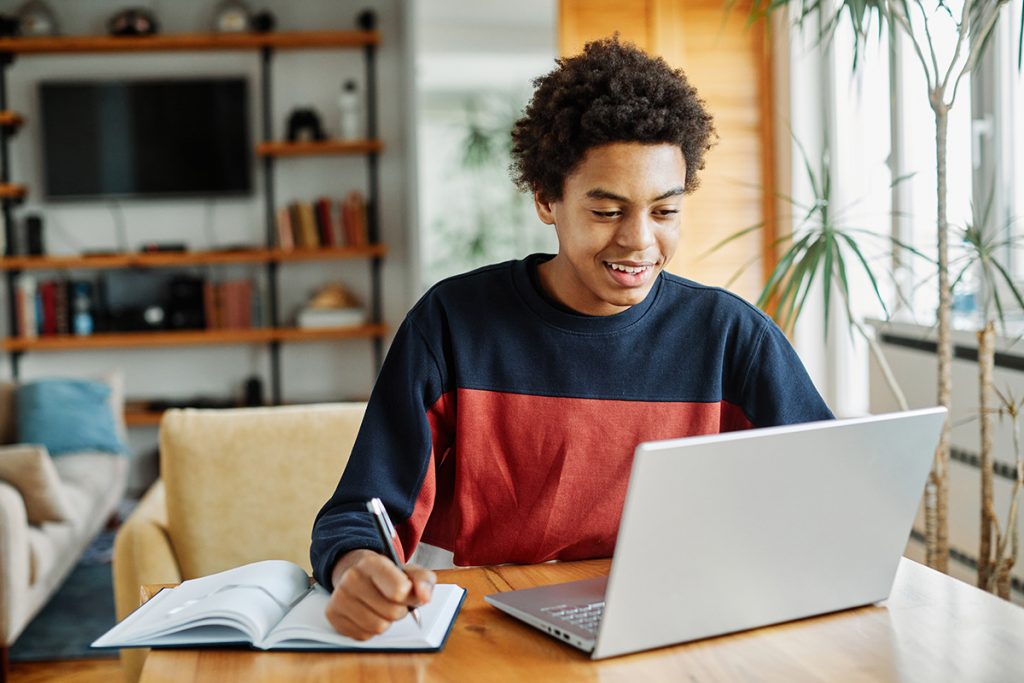How many arguments have you had with your teen over doing homework? What about just getting them into the car on time to get them to school? Or have you given up trying to get anywhere on time? Routines can help teens with ADHD. That’s because they directly address the executive functioning skills that people with ADHD naturally deal with.
Teens with ADHD struggle with executive functioning
Executive functioning includes the skills used to organize, plan, and execute tasks. From getting ready in the morning or finishing homework to finally clearing the boss level of their favorite video game, your teen’s brain relies on executive functioning to get things done. Why are some things—like beating a game—easier for them? Games (and other things they want to do) pique their interests, cater to their skills, and often offer more stimulation.
Daily tasks, on the other hand, require:
- Organization: Organizing everything (rather than entering a world where everything is already at hand) can feel impossible.
- Time management: When there is so much to do, figuring out what comes next for someone with ADHD often isn’t straightforward.
- Task initiation: Starting a morning routine, chores, or homework means having to engage in something that they have to do rather than want to do.
- Emotional regulation: If whatever they need to do triggers a rage attack or even just simple frustration, they might avoid it.
Routines help reduce the burden of trying to keep track of everything without getting distracted. Setting up some clear boundaries and expectations can give them an approachable way to do the things they feel like they don’t have the attention to do.

How to create effective routines for your ADHD teen
Your teen’s routines will be unique, but there are a few good ground rules to any of them:
Make space
Dedicate a spot in a room where the activity needs to happen. If that’s homework, keep the table or a desk clear where they can sit and work on it. Keep things decluttered so there are fewer distractions, and keep phones in a different room unless they need them to complete their homework.
Set start and stop times
Just like dedicating space works, dedicating start and stop times does too. You may have noticed that your teen procrastinates and crams last-minute before an assignment is due. That might be because they now have a deadline to hit, and the consequences of not doing so are real. Set both start and stop times for things like getting breakfast in the morning, homework, and even fun things like gaming or social media.
Use reminders
You (and your teen) probably know that journals, calendars, and task lists are good ways to keep track of things. Actually using them is a different story, and how you use them matters. Worried about missing a start time? Set an alarm. Nobody will know if you have alarms at different points during the day but you and your teen. Put sticky notes on mirrors, the front door, and other places where forgetfulness strikes.
Know when tech can help
Phones and computers can be lifesavers when it comes to staying on track, but they can also be your worst enemy. Fun, dopamine-rich things are just a couple of swipes away. Try using your calendar app and voice assistant to add events when you don’t want to open your phone. Keep phones and chargers in rooms away from where productivity needs to happen. If something needs to be done, avoid going online until it’s done.
Treat task time and fun time the same
If the only things that are on a schedule are to-dos, it can stand in the way of your teen being okay doing them. Put up boundaries around gaming, social media, TV, and other casual, fun activities, too. That way, they can make the connection that everything can be done in moderation and that they will still have time to do the things they want to. Just seeing that they have an hour blocked off in their afternoon or evening where they can do whatever they want can be motivating.
Create your own home routine
Keep in mind that if you have multiple kids, it might help to get them into similar routines as your ADHD teen. The goal of a routine is to help your teen be more independent over time while still taking care of all of their responsibilities. Rather than getting distracted or frustrated, they can get what they need to do done and still make time for what they look forward to.
Use this framework with your teen to create a routine that will work for them.
How ADHD treatment can help with executive functioning
Your teen won’t develop stellar executive functioning skills overnight. And, as helpful as they are, routines probably won’t solve every issue they face. ADHD treatment can help your teen manage their symptoms, making it easier for them to stay organized and on time. At Family First, we help teens with ADHD manage their symptoms and develop their executive functioning skills with evidence-based practices.
- Medication is a safe, effective part of ADHD treatment for many teens. Stimulant medications are the right choice for most ADHD teens and work directly in the areas of the brain that affect executive functioning.
- Organizational tools take some practice to use the right way. Our team helps teens and parents find the tools that work for them and then how they can use them in their daily lives.
- Teens practice their skills in one-on-one sessions with therapists at Family First and in groups with peers their age. By reinforcing what they learn in a safe space, they can be more confident when they go home or to school.
- Cognitive-behavioral therapy (CBT) gives teens the tools they need to regulate their emotions better. By learning emotional regulation with our therapists, teens can experience less frustration so they can stay on track.
- Normal school programming can be a nightmare for neurodivergent teens. We help teens find better ways to study. We also work closely with schools to help teens and parents get the accommodations they need.
Neurodiversity-affirming care is a major focus for us here at Family First. We know your teen doesn’t need “fixing”; they just need help figuring out how to navigate the world around them. Call 888.904.5947 or message online to see how we can help.

